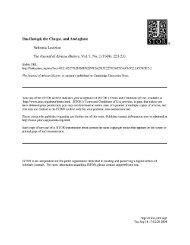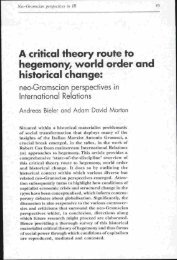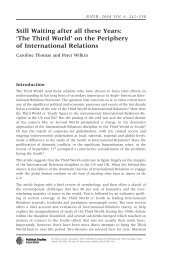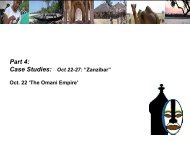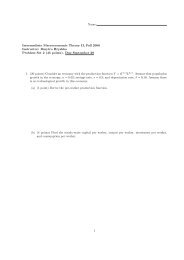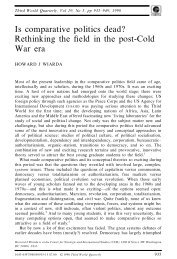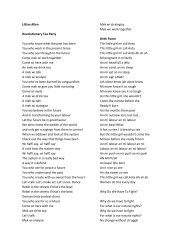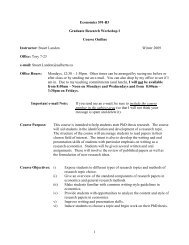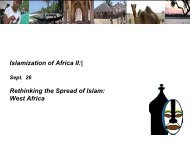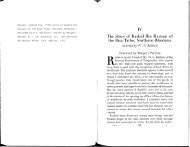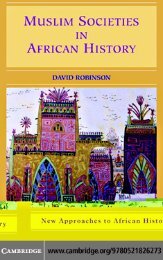personal memories revolutionary states and indian ocean migrations
personal memories revolutionary states and indian ocean migrations
personal memories revolutionary states and indian ocean migrations
You also want an ePaper? Increase the reach of your titles
YUMPU automatically turns print PDFs into web optimized ePapers that Google loves.
THE OTHER ‘ANDALUS’<br />
THE OMANI ELITE IN ZANZIBAR<br />
AND THE MAKING OF AN IDENTITY,<br />
1880s-1930s<br />
Amal N. Ghazal ∗<br />
In 1997, the Arab journalist Riyāḍ al-Rayyis visited Zanzibar, the famous<br />
isl<strong>and</strong> on the East African coast. The visit evoked for him <strong>memories</strong> of Arab glory<br />
lost in the cities of the Iberian Andalusia. Zanzibar’s Arab-Islamic heritage as well<br />
as tragic events of 1964 that resulted in the massacre <strong>and</strong> expulsion of Arabs (<strong>and</strong><br />
others) granted the isl<strong>and</strong>, according to al-Rayyis, a status in Arab history <strong>and</strong><br />
memory similar to that of Andalusia. 1 In some respects, the comparison between<br />
Zanzibar <strong>and</strong> Andalusia is an overstated <strong>and</strong> an overstretched one but it<br />
nonetheless invites an inquiry into a phase of Arab-Muslim history on an isl<strong>and</strong> that<br />
was not only a prosperous trade terminus but also an entrepôt for ideas <strong>and</strong> a<br />
significant hotbed of modern Arab-Islamic intellectualism.<br />
Brought under the formal rule of al-Busa‘īdīs in 1832, Zanzibar became the<br />
capital city of the Omani dynasty. The ambitious plan of its founder, Sayyid Sa‘īd (r.<br />
1806-1856), to transform Zanzibar into a major economic center <strong>and</strong> an<br />
international seaport opened the gates for a flood of migrants from Oman as well<br />
as Hadramawt <strong>and</strong> India. A number of those were ‘ulama whose presence in<br />
Zanzibar institutionalized the long presence of Islam on the isl<strong>and</strong> <strong>and</strong> resulted in<br />
an unprecedented spread of Islamic institutions <strong>and</strong> of a literate Islamic tradition<br />
that was Arabic in character. They also brought ideas <strong>and</strong> ideologies, ties <strong>and</strong><br />
connections, <strong>and</strong> along with the rulers, they changed the intellectual <strong>and</strong> political<br />
l<strong>and</strong>scape of Zanzibar. Together they pulled Zanzibar closer to the Arab <strong>and</strong><br />
Muslim world.<br />
Following Sayyid Sa‘īd’s death in 1856, the rivalry between two of his sons<br />
provided Britain, now the major power broker in the Indian Ocean, with the<br />
opportunity to force a separation between Oman <strong>and</strong> Zanzibar, each to be headed<br />
by a descendant of Sayyid Sa‘īd. Zanzibar was declared a British protectorate in<br />
1890 <strong>and</strong> gained independence in 1963. A year later, a coalition of communists,<br />
∗ Amal Ghazal is currently a post-doctoral fellow at the University of Toronto <strong>and</strong> will be an assistant<br />
professor at Dalhousie University starting July 2006. She specializes in modern Arab <strong>and</strong> Islamic<br />
intellectual history. She is currently working on the Arab press <strong>and</strong> the reassertion of an Arab-Muslim<br />
identity during the interwar period, on Muslim intellectual networks in the Arab world <strong>and</strong> on Salafi<br />
Ibadism.



